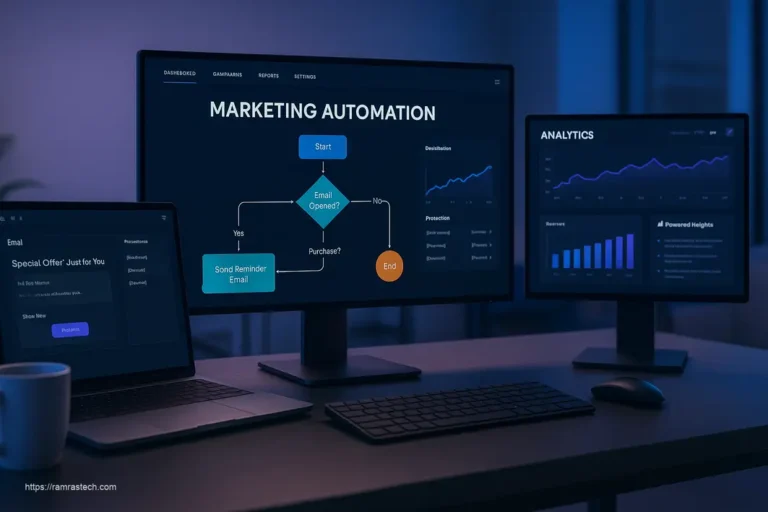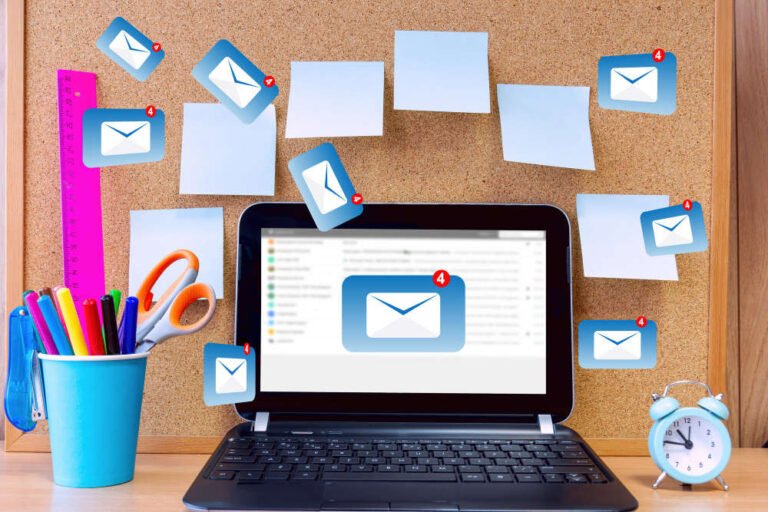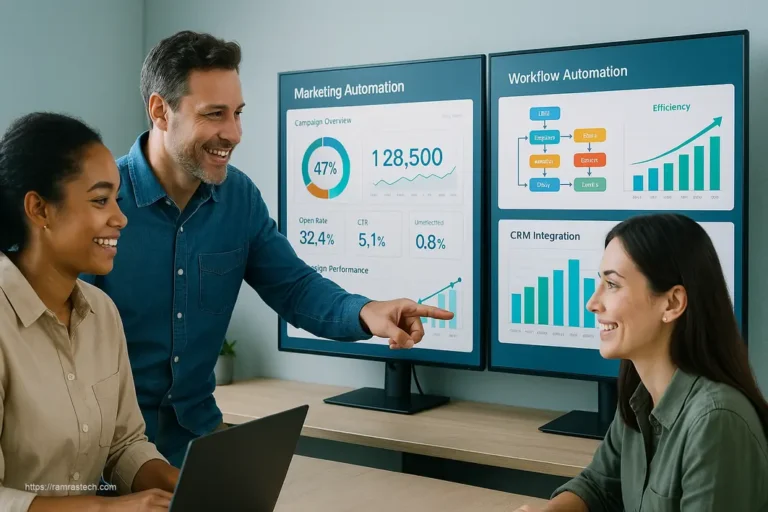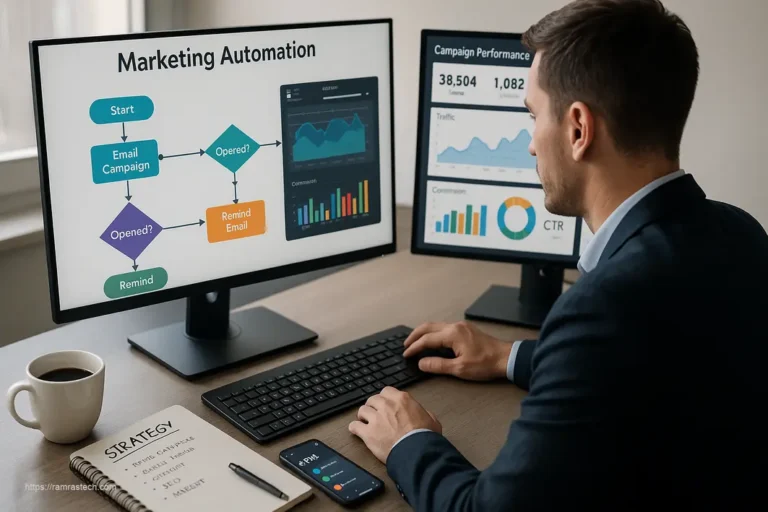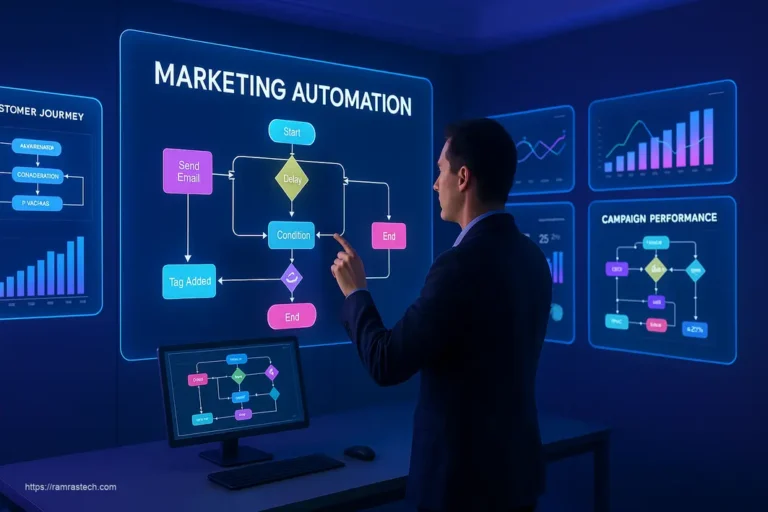5 Unbeatable Marketing Automation Tools You Need in 2025

In today’s fast-paced digital landscape, marketers are under constant pressure to deliver personalized experiences while managing countless channels simultaneously. Sound familiar? If you’re nodding your head, it’s time to explore how marketing automation tools can transform your workflow and amplify your results.
What Are Marketing Automation Tools and Why Do You Need Them in 2025?
Marketing automation tools are software platforms that enable businesses to automate repetitive marketing tasks across multiple channels. They’re not just nice-to-have anymore—they’ve become essential weapons in every marketer’s arsenal.
Think about it: how much time do you waste on manual email sends, social media scheduling, or lead scoring? Marketing automation eliminates these tedious tasks, freeing your team to focus on strategy and creativity instead of execution.
According to recent data, businesses using marketing automation report a 14.5% increase in sales productivity and a 12.2% reduction in marketing overhead. Not to mention, the marketing automation software market is projected to reach $25.1 billion by 2025—up from $6.08 billion in 2019. These numbers tell us one thing: automation isn’t just trending; it’s revolutionizing marketing as we know it.
How Marketing Automation Tools Transform Your Marketing Strategy
Before diving into specific platforms, let’s explore how these tools can reshape your entire marketing approach:
1. Streamlined Lead Management
Gone are the days of manually sorting through leads. Modern marketing automation platforms automatically:
- Capture lead information across touchpoints
- Score leads based on engagement and behavior
- Nurture leads through personalized content sequences
- Transfer qualified leads to sales at the optimal moment
This systematic approach ensures no potential customer falls through the cracks while saving your team countless hours of manual work.
2. Enhanced Customer Journey Mapping
Marketing automation tools provide unprecedented visibility into the customer journey. They track interactions across channels, revealing:
- Which content resonates with specific audience segments
- When prospects are most receptive to communications
- Which touchpoints drive conversions
- Where bottlenecks occur in your sales funnel
With these insights, you can craft more effective customer journeys that guide prospects smoothly from awareness to purchase.
3. Advanced Personalization at Scale
One of the most powerful benefits of marketing automation is the ability to deliver personalized experiences to thousands—or even millions—of customers simultaneously.
Modern tools analyze behavior patterns and preferences to automatically tailor:
- Email content and send times
- Website experiences
- Product recommendations
- Ad targeting parameters
This level of personalization was previously impossible without massive teams dedicated to individual customer communications.
4. Cross-Channel Campaign Coordination
Marketing automation enables cohesive messaging across all your marketing channels, including:
- Email marketing
- Social media
- SMS and mobile notifications
- Paid advertising
- Website content
- Direct mail
This unified approach ensures consistent messaging that reinforces your brand story at every touchpoint.
Top 7 Marketing Automation Tools Worth Your Investment in 2025
Now let’s explore the leading marketing automation platforms that deserve your attention this year:
1. HubSpot Marketing Hub: Best All-in-One Solution
HubSpot’s Marketing Hub has established itself as the gold standard for comprehensive marketing automation, particularly for businesses seeking an integrated approach to their marketing, sales, and service operations.
Key Features:
- User-friendly automation workflow builder
- Comprehensive CRM integration
- Robust content management system
- Advanced lead scoring and nurturing
- In-depth analytics and attribution reporting
- A/B testing capabilities across channels
Pricing: HubSpot offers tiered pricing starting with a free plan with limited features. Paid plans range from $45/month for Starter to $3,600/month for Enterprise.
Who it’s best for: HubSpot excels for mid-sized businesses looking for an intuitive yet powerful platform that seamlessly connects marketing with sales and customer service functions. With its user-friendly interface and educational resources, it’s particularly valuable for teams newer to marketing automation.
Many businesses report significant efficiency gains after implementing HubSpot. As one marketing director shared, “We reduced our lead qualification time by 75% while simultaneously increasing conversion rates by 24% after implementing HubSpot’s automated workflows.”
2. ActiveCampaign: Best for Small Business Automation
If you’re running a small to mid-sized business with limited marketing resources, ActiveCampaign offers sophisticated automation capabilities without overwhelming complexity.
Key Features:
- Visual automation builder with drag-and-drop interface
- Machine learning-powered predictive sending
- Site tracking for behavioral triggers
- Conversion-focused landing page builder
- SMS marketing automation
- Split testing capabilities
Pricing: Plans start at $29/month for up to 500 contacts and scale based on contact count and feature requirements.
Who it’s best for: ActiveCampaign is ideal for small businesses that need powerful automation features without enterprise-level complexity or cost. Its intuitive interface makes it accessible even to marketing teams with limited technical expertise.
The platform’s strong focus on customer experience automation has earned it a 4.7/5 rating on G2, with users particularly praising its ease of use and value for money.
3. Marketo Engage: Best for Enterprise-Scale Automation
For larger organizations with complex marketing requirements, Marketo Engage (now part of Adobe Experience Cloud) offers unparalleled depth and flexibility.
Key Features:
- Advanced lead management and scoring
- Account-based marketing capabilities
- Revenue cycle modeling
- Cross-channel engagement tracking
- Extensive API and integration options
- Sophisticated analytics and attribution
Pricing: Marketo operates on custom pricing, typically starting around $1,195/month for basic packages.
Who it’s best for: Marketo is designed for enterprise-level organizations with sophisticated marketing needs and dedicated marketing operations teams. Its robust capabilities are particularly valuable for B2B companies with complex sales cycles.
According to Gartner’s Magic Quadrant for B2B Marketing Automation Platforms, Marketo consistently ranks as a leader, with particular strength in handling complex, multi-touch marketing campaigns across global organizations.
4. Klaviyo: Best for E-commerce Automation
E-commerce businesses have unique marketing automation needs, and Klaviyo has emerged as the specialist platform of choice in this vertical.
Key Features:
- Deep integration with major e-commerce platforms
- Advanced customer segmentation based on purchase history
- Abandoned cart recovery automation
- Product recommendation algorithms
- Post-purchase follow-up sequences
- Revenue attribution reporting
Pricing: Klaviyo uses a contact-based pricing model starting at $20/month for up to 500 contacts.
Who it’s best for: Klaviyo is purpose-built for e-commerce businesses of all sizes that want to leverage customer data to drive repeat purchases and increase lifetime value.
One swimwear brand reported a 53% increase in repeat purchase rate after implementing Klaviyo’s post-purchase automation sequences. The platform’s focus on e-commerce-specific use cases makes it particularly effective for online retailers.
5. Salesforce Marketing Cloud: Best for Data-Driven Enterprise Marketing
As part of the broader Salesforce ecosystem, Marketing Cloud offers powerful automation capabilities with unparalleled data integration potential.
Key Features:
- Journey Builder for multi-channel campaign orchestration
- Einstein AI for predictive analytics and optimization
- Audience Studio for data management
- Interaction Studio for real-time personalization
- Mobile messaging automation
- Advanced social media management
Pricing: Salesforce Marketing Cloud operates on custom pricing, with individual modules typically starting at $400/month.
Who it’s best for: Salesforce Marketing Cloud is ideal for large enterprises already invested in the Salesforce ecosystem who need sophisticated data integration capabilities across marketing, sales, and service.
The platform’s strength lies in its ability to unify customer data across touchpoints, making it particularly valuable for organizations with complex customer relationships spanning multiple products or services.
6. Mailchimp: Best Budget-Friendly Automation
Mailchimp has evolved from a simple email marketing tool into a capable marketing automation platform that remains accessible to businesses with limited budgets.
Key Features:
- User-friendly automation builder
- Customer journey mapping
- Behavioral targeting capabilities
- Website visitor tracking
- Basic CRM functionality
- Content optimization recommendations
Pricing: Mailchimp offers a free plan for up to 500 contacts with limited features. Paid plans start at $11/month and scale with contact count and functionality.
Who it’s best for: Mailchimp is perfect for small businesses and startups just beginning their marketing automation journey who need an affordable, user-friendly platform with room to grow.
With over 11 million active users, Mailchimp has established itself as the go-to entry point for marketing automation. Its intuitive interface and educational resources make it particularly valuable for marketing novices.
7. Brevo (formerly Sendinblue): Best Value for Growing Businesses
Brevo offers a compelling mix of advanced features at mid-market pricing, making it an excellent choice for growing businesses looking to scale their automation efforts.
Key Features:
- Workflow automation builder
- Transactional email capabilities
- SMS marketing automation
- Landing page and form builder
- Facebook ads integration
- Chat functionality
Pricing: Brevo offers a free plan with limited features and up to 300 emails per day. Paid plans start at $25/month and scale based on email volume and features.
Who it’s best for: Brevo is ideal for growing businesses that need more sophisticated features than entry-level platforms but aren’t ready for enterprise-level solutions.
The platform has gained popularity for its balanced approach to pricing and features, earning a 4.6/5 rating on G2 with particular praise for its value proposition and customer support.
How to Choose the Right Marketing Automation Tool for Your Business
With so many options available, selecting the right marketing automation platform requires careful consideration of your specific needs. Here’s a framework to guide your decision:
1. Assess Your Marketing Maturity Level
Your current marketing sophistication should heavily influence your choice:
- Beginners: If you’re new to automation, prioritize user-friendly interfaces and strong educational resources. Platforms like Mailchimp or Brevo offer gentler learning curves.
- Intermediate: Growing businesses with established marketing processes should look for scalable solutions that balance ease of use with advanced capabilities, such as ActiveCampaign or HubSpot.
- Advanced: Enterprise organizations with complex requirements need the depth and flexibility of platforms like Marketo or Salesforce Marketing Cloud.
2. Evaluate Integration Requirements
Your marketing automation platform needs to play nicely with your existing technology stack, particularly:
- CRM system
- E-commerce platform
- Content management system
- Analytics tools
- Social media management software
Before committing, verify that your chosen platform offers native integrations or API access to connect with your critical systems.
3. Consider Your Team’s Technical Capabilities
Be realistic about your team’s ability to implement and manage complex systems:
- Do you have dedicated marketing operations staff?
- What’s your team’s experience with similar platforms?
- Will you need ongoing implementation support?
More sophisticated platforms like Marketo offer tremendous power but typically require dedicated technical resources to manage effectively.
4. Prioritize Features Based on Your Marketing Strategy
Different businesses have different automation priorities:
- E-commerce: Prioritize abandoned cart recovery, product recommendations, and purchase-based segmentation.
- B2B: Focus on lead scoring, account-based marketing, and longer nurture sequences.
- Service businesses: Emphasize appointment scheduling, review generation, and relationship nurturing.
Make a list of must-have features before evaluating platforms to ensure you’re investing in capabilities you’ll actually use.
5. Calculate Total Cost of Ownership
Look beyond the monthly subscription fee to understand the full investment:
- Implementation costs
- Training expenses
- Potential need for specialized staff or consultants
- Additional costs for exceeding contact limits or accessing premium features
The most affordable platform on paper may not be the most cost-effective when all factors are considered.
Implementing Your Marketing Automation Strategy: Best Practices
Selecting the right tool is just the beginning. Here’s how to ensure successful implementation and adoption:
1. Start with Clear Objectives
Define specific, measurable goals for your marketing automation implementation:
- Increase marketing-qualified leads by X%
- Reduce lead response time to Y minutes
- Improve email engagement rates by Z%
- Decrease manual marketing tasks by X hours per week
These metrics will help you measure ROI and adjust your strategy as needed.
2. Map Your Customer Journey First
Before building automation workflows, document your ideal customer journey:
- What content do prospects need at each stage?
- Which interactions indicate progression to the next stage?
- What are the key conversion points?
- Where do prospects typically get stuck?
This mapping exercise provides the blueprint for your automation architecture.
3. Implement in Phases
Avoid the temptation to automate everything at once. Instead:
- Start with high-impact, low-complexity use cases
- Measure results and refine
- Gradually expand to more sophisticated workflows
- Continuously optimize based on performance data
This iterative approach reduces risk and builds internal expertise over time.
4. Invest in Team Training
The success of your marketing automation implementation depends heavily on user adoption. Ensure your team:
- Receives comprehensive platform training
- Understands the strategy behind your automation efforts
- Has access to ongoing support resources
- Is incentivized to use the system correctly
Even the most powerful platform will fail if your team doesn’t embrace it.
5. Balance Automation with Human Touch
While automation drives efficiency, the human element remains critical for customer connection. Determine where:
- Automation can handle routine communications
- Human intervention adds significant value
- A hybrid approach works best
The most successful automation strategies complement rather than replace meaningful human interactions.
The Future of Marketing Automation: Trends to Watch
As you implement your marketing automation strategy, keep an eye on these emerging trends that will shape the landscape in the coming years:
1. AI-Powered Personalization
Artificial intelligence is rapidly transforming marketing automation, enabling:
- Predictive content recommendations
- Natural language generation for dynamic content
- Automated optimization of send times and channels
- Anomaly detection for campaign performance
Platforms are increasingly incorporating these capabilities to deliver even more personalized customer experiences at scale.
2. Conversational Marketing Integration
The line between marketing automation and conversational interfaces continues to blur, with leading platforms now offering:
- Chatbot integration for real-time engagement
- Voice assistant compatibility
- SMS and messaging app automation
- Unified conversation tracking across channels
This trend reflects the growing customer expectation for immediate, personalized responses.
3. Enhanced Privacy Compliance Features
As privacy regulations evolve globally, marketing automation platforms are developing more sophisticated compliance features:
- Granular consent management
- Automated privacy policy enforcement
- Geographic data handling rules
- Enhanced anonymization capabilities
These features will become increasingly important as regulatory scrutiny intensifies.
4. Revenue Attribution Modeling
Marketing automation platforms are moving beyond basic campaign metrics to provide sophisticated attribution insights:
- Multi-touch attribution across channels
- Predictive revenue modeling
- Customer lifetime value forecasting
- ROI optimization recommendations
This evolution helps marketers demonstrate concrete business impact from their automation investments.
Common Marketing Automation Pitfalls to Avoid
As you implement your marketing automation strategy, be aware of these common mistakes:
1. Over-Automating Too Quickly
The enthusiasm for automation can lead to overly complex systems that are difficult to maintain. Start with critical workflows and expand methodically as you gain expertise.
2. Neglecting Content Requirements
Automation requires substantial content to function effectively. Many implementations falter because teams underestimate the content creation demands of sophisticated nurture sequences.
3. Poor Data Hygiene Practices
Automation is only as good as the data driving it. Establish rigorous data management protocols to ensure your automations work with accurate, complete information.
4. Focusing on Technology Over Strategy
The most sophisticated platform can’t compensate for a weak marketing strategy. Ensure your automation implementation serves clear business objectives rather than pursuing technology for its own sake.
5. Set-and-Forget Mentality
Effective automation requires ongoing optimization based on performance data. Schedule regular reviews to refine your workflows based on results.
FAQs About Marketing Automation Tools
What exactly is marketing automation?
Marketing automation refers to software and strategies that allow companies to automate repetitive marketing tasks and workflows. It helps businesses nurture prospects with personalized content, convert customers more efficiently, and measure marketing effectiveness across channels—all while reducing manual effort. Modern marketing automation combines email, social media, website interactions, and other touch points into unified customer experiences.
How much do marketing automation tools typically cost?
Marketing automation pricing varies widely based on features and scale. Entry-level solutions like Mailchimp or Brevo start with free plans and scale to $25-$100/month for growing businesses. Mid-market platforms like ActiveCampaign or HubSpot range from $100-$1,000/month depending on contact volume and capabilities. Enterprise solutions like Marketo or Salesforce Marketing Cloud typically start at $1,000-$4,000/month and can exceed $25,000/month for large implementations with advanced features.
Do small businesses really need marketing automation?
Yes, small businesses often benefit significantly from marketing automation, though they should choose appropriately scaled solutions. Small businesses typically suffer most from limited resources and manual processes. Even basic automation can reclaim hours spent on repetitive tasks like email sending, lead follow-up, and social posting. Entry-level platforms offer affordable options that grow with your business while delivering substantial efficiency gains and more consistent customer experiences from day one.
How long does it take to implement a marketing automation platform?
Implementation timelines vary based on platform complexity and organizational readiness. Basic platforms like Mailchimp or Brevo can be operational within days or weeks. Mid-market solutions like ActiveCampaign or HubSpot typically require 1-3 months for proper setup, integration, and workflow development. Enterprise platforms like Marketo or Salesforce Marketing Cloud generally demand 3-6 months or more for full implementation, often requiring specialized consultants or dedicated technical resources to deploy effectively.
Can marketing automation replace my marketing team?
No, marketing automation complements rather than replaces human marketers. Automation handles repetitive execution tasks, data analysis, and basic decision-making, but still requires human expertise for strategy development, creative content creation, emotional intelligence in communications, and interpreting complex customer signals. The most effective approach combines automation’s efficiency with human creativity and judgment. Think of automation as a tool that elevates your team by freeing them from routine tasks so they can focus on higher-value strategic and creative work.
Conclusion: Selecting Your Marketing Automation Partner
The right marketing automation tool can transform your marketing department from a cost center into a revenue-generating powerhouse. By carefully assessing your specific needs, technical capabilities, and growth plans, you can select a platform that delivers immediate efficiency gains while supporting your long-term marketing vision.
Remember that successful automation is a journey, not a destination. Start with clear objectives, implement methodically, and continuously optimize based on results. With the right approach, marketing automation can become your competitive advantage in an increasingly crowded digital landscape.
Ready to explore how marketing automation can transform your social media strategy or complement your existing digital marketing efforts? The platforms covered in this guide represent the best options available in 2025—each offering unique strengths for different business needs and maturity levels.
The future of marketing is automated, personalized, and data-driven. The only question is: which platform will you choose to take you there?
